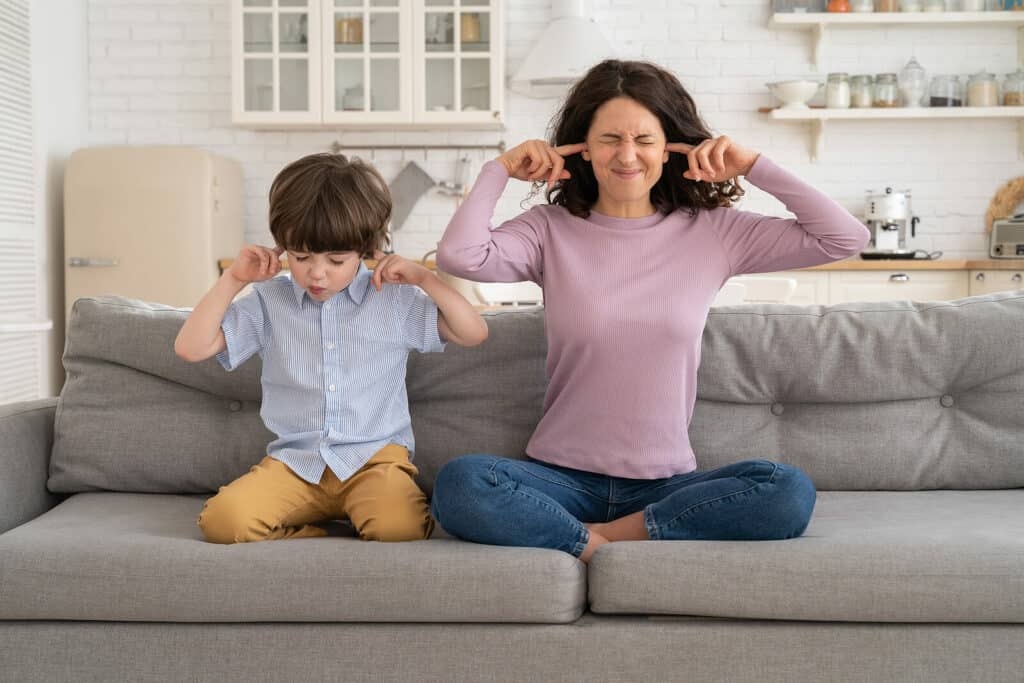We live in a noisy world full of traffic, construction, and the never-ending roar of progress. From jackhammers to emergency vehicle sirens, it seems that loud noises are difficult to escape, whether we live in the suburbs, city or even country. The World Health Organization (WHO) defines noise above 65 decibels (dB) as noise pollution and decibels above 70 dBA as dysregulating to our nervous system when exposed for 24 hours or more. We can’t always escape noise in our lives, but we can attempt to minimize or dampen it. Here are some surprising sources of noise which may be in your home and could even be damaging your ears right now.
How Much Noise Is Too Much Noise?
The National Institute on Deafness and Other Communication Disorders (NIDCD) reports that a constant exposure for eight hours or more of 85 decibels (dBA) can damage the inner ear, causing permanent hearing damage. Decibels are the measurement of loudness of sound and the louder the sound, the shorter the exposure time. For every increase of three decibels the exposure time is cut in half. For instance at 88 dBA it only takes 4 hours for damage to occur and so on. By the time sounds reach over 100 dBA damage can occur in under 15 minutes!
We collect sound with our ears, but hearing occurs in our brain. When sound surpasses a safe listening threshold it causes vibrations severe enough to damage the cells, solely responsible for transmitting sound from our ears to our brain, leaving us with gaps in our hearing and over time causing notable hearing loss.
Most Dangerous Household Items for Your Hearing Health:
Earbuds & Headphones
Let start with the number one most common risk to hearing, especially for people of a younger generation. WHO reports that the number one cause of hearing loss is loud music. We can wear our hearing protection when we go to the club or a show, however the greatest risk comes at home or work while listening to headphones.
Headphones have become a staple of our society since their introduction in 1979 with the Sony Walkman. We listen to relax, work or workout without disturbing others. However, headphones have the potential to pipe decibels into your ear as loud as 105 dBA or more. Due to the seemingly endless streaming of music and media, people can listen to these damaging levels for hours at a time, causing hearing loss that will last a lifetime. If you listen to headphones you don’t have to stop—just listen safely. Keep the volume no higher than 60 percent of the potential volume and take listening breaks every 30 to 45 minutes to cut down on exposure time.
Home Appliances
Why would they sell it if it could damage my hearing? One household appliance may not meet damaging levels but when all running at the same time, decibel levels add up to a cacophony which could create a dangerous listening environment. For instance, your vacuum cleaner is likely to be between 70 and 90 dB, while your blender can reach up to 100 decibels. Run at the same time along with a noisy fridge and air conditioning unit, these decibels add up. Make sure to run as few noisy appliances at once as possible and remember that carpeting in your home adds sound insulation which can dampen the decibel levels to a safer zone.
Power Tools
Are you a DIY home improvement person? It’s liberating and even relaxing to work on home projects when you can truly focus, but keep in mind that the power tools required for most jobs can reach dangerous decibel levels. Common power tools include power drills which can reach 100 dBA, a gas lawnmower with the potential for 105 dBA, or a chainsaw reaching 110 dBA easily. Part of doing a DIY job is making sure you are taking all the precautions possible, and this includes appropriate hearing protection.
Seeking Treatment
It’s important to understand that once your hearing is damaged it is irreversible. Still even with damage your hearing can almost always get worse. If you suspect you have noise induced hearing damage, it’s never too late to start listening safer. In addition, make sure to schedule a hearing exam and seek treatment for a hearing loss today.





